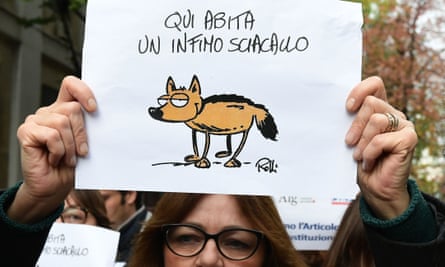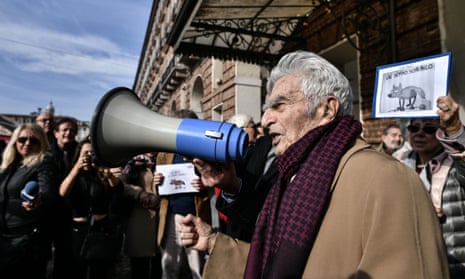Journalists have joined protests in Italy after leaders of the Five Star Movement (M5S) branded those working in the profession as “jackals” and “whores”.
The anti-establishment party, which is ruling in coalition with the far-right League, has also renewed threats to cut funding for publishers and introduce new conflict-of-interest laws as relations with the media hit a new low after the mayor of Rome was acquitted for cronyism on Saturday.
Virginia Raggi was cleared of abuse of power after a judge ruled that the alleged offence did not constitute a crime.
Luigi Di Maio, the M5S leader and deputy prime minister, lashed out at journalists who had reported on the case for two years, calling them “jackals” and accusing them of generating “fake news” in order to bring down the M5S mayor. Alessandro Di Battista, a prominent party figure, described the journalists as “whores”.
The insults sparked fury among the journalists’ unions, FNSI and Usigrai, which organised flash mobs to take place on Tuesday in major Italian cities as well as in Brussels and London.

“Freedom of the press is under attack,” said Vittorio di Trapani, the president of Usigrai. “It is clear that this is not only about isolated cases, but a strategy to hit journalists, the freedom of the press, and therefore the right for citizens to be informed.”
Raffaele Lorusso, the president of FNSI, pointed out that the same journalists who reported on the Raggi case also covered legal proceedings against her centre-left Democratic party predecessor Ignazio Marino, who was eventually cleared of accusations of fiddling his expenses. Marino quit in 2015, with online attacks by M5S politicians contributing to his downfall.
“The journalists insulted for their reporting on Raggi did not spare Marino either … previously they were fine, but not today?” Lorusso said. “Di Maio and those like him within M5S who dream of having information on a leash must get over it: threats or insults will not prevent journalists from doing their work.”
Italy’s foreign press association signalled its solidarity with “colleagues who are increasingly being attacked in Italy and around the world”, saying: “We strongly believe that our work is one of the pillars of democracy and today, more than ever, it must be protected.”
When asked if he would like to reconsider his remarks during a television interview on Sunday night, Di Maio replied: “Absolutely not. The game now is to extol the League and depict us like the plague. They’re trying to make the government fall but we’re not taking the bait.”
In September, Di Maio threatened to pull advertising by state-run companies in newspapers after accusing them of “polluting the political debate every day”.
M5S takes particular aim at La Repubblica, often accusing it of perpetrating “fake news”, a phrase popularised by the US president, Donald Trump. It is also common for journalists and other commentators who criticise the party to be met with a deluge of online abuse.
“I know when an article of mine is effective as the trolls start biting,” said Gianni Riotta, the director of the school of journalism at Rome’s Luiss University. “But the ones producing the most venom are the TV shows, newspapers and blogs that support the government.”
M5S, which built most of its support online, has been accused of spreading misinformation via unofficial social media accounts.
Riotta said the threat to cut public funding for newspapers was based on “complete falsehood” as money from the state to sustain major dailies was scrapped several years ago, with only a handful of local newspapers as well as Avvenire, a publication affiliated with the Catholic church, currently benefiting from subsidies.
In an article in October, Mario Calabresi, the director of La Repubblica, said M5S leaders knew there were no funds to cut but repeated the claim in order to give the impression that journalists were on the government payroll.
“The point here is not about not criticising the Italian press – I do it often,” said Riotta. “The point is that our constitution gives journalists a role in our democracy, and they are trying to undermine that role; this is what is dangerous, they are trying to run a government without the press checking on them.”
